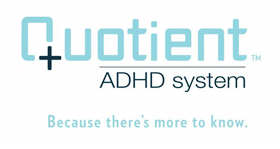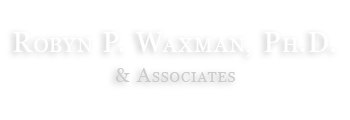Latest Articles
- Seeking an Objective Test for Attention Disorder (The New York Times)
- The Lab Rat: A Better Way to Diagnose ADHD (Time Magazine)
- Objective Measures of ADHD Symptoms Using the Quotient™ ADHD System May Reduce Cost of ADHD Drug Trials (Medical News Today)
- Accurately Diagnosing ADHD (The Sidewalk Psychiatrist)
- Objective ADHD Test (Facebook Page)
- Detecting Fakers
- Sample Printout Off and On Medication
YouTube Videos

The Quotient ADHD System was developed at Harvard University, in an effort to make the diagnosis of ADHD less subjective. It is the only system that has been FDA-cleared to provide an objective measurement of hyperactivity, impulsivity and inattention. This means that parents can make decisions about whether to medicate their children based on something more than a simple checklist or even a multi-day psycholoeducational assessment. Leading experts in the field of ADHD, including Dr. Ed Hallowell (Driven to Distraction), are using the Quotient in their clinics.
The Quotient is ideal for 1) confirming the diagnosis of ADHD in individuals who have already been diagnosed and establishing a baseline measure for their ADHD symptoms, 2) monitoring efficacy of medication if an individual is using medication to manage their ADHD, 3) ruling out ADHD where the diagnosis is unclear, 4) teasing out other factors that might impact an individual's functioning in school or everyday activities.
I have been doing educational testing for ADHD and learning disabilities here in Baltimore for more than 15 years and I have never been as excited or enthusiastic about an instrument as I am about this. I see such tremendous value in having objective data when you are making decisions about whether or not to medicate your child. The Quotient can help ensure that children who do not have ADHD are not medicated unnecessarily. At the same time, the Quotient helps us to more comfortably diagnose those children who are slipping through the cracks or are "getting by" but who could genuinely benefit from medication.
What is the Quotient?
The Quotient is a short, computerized test. The client performs a computerized game-like task that measures sustained attention on a monotonous task.
- 15 minutes to complete for children 6-14
- 20 minutes for teens 15 years or older
- It can also be used for adults up to the age of 55
How Can it be Used?
Ideally, a child would be tested off of medication to help confirm the diagnosis of ADHD and to determine how severe the symptoms are. This is considered a baseline measure.
This would be perfect for families who are not certain that their child really has ADHD and for families whose children have ADHD but the children have not responded well to medication.
A child could then be tested on medication to help determine whether the medication is the best dose for them.
If the medication is working, the child should look like a non-ADHD child when tested again. Some children actually do better on lower doses of medicine, while others might need a higher dose. It is interesting to note that in some cases, teachers and parents report that their kids are doing better because the hyperactivity or disruptive behaviors have improved; however, the Quotient will test whether the child has actually improved on other measures that impact learning (like sustained attention).
A child could be tested if they are on medication but the problematic behaviors persist-particularly if several medications have been tried without success.
The Quotient might show that the ADHD is actually well-managed while the child is on medication. This would suggest that there are other factors at play. These might be emotional (e.g., anxiety or depression) or behavioral, environmental, or academic. In these cases, families can pursue other avenues of treatment to help them, in conjunction with medication.
The child can be used to tease out other issues that sometimes look like ADHD.
The child's performance is evaluated every 30 seconds and the entire pattern of responses is compared with a national database of children who have been diagnosed with ADHD using strict diagnostic criteria. In many cases, children who have anxiety or depression are misdiagnosed with ADHD. In these cases, the child's pattern of responses on the Quotient tends to look much different than a child with ADHD.
How Much Does the Quotient Test Cost?
The cost of the Quotient may be covered by insurance, although I am an out-of-network provider so families need to confirm this with their insurance companies.
The cost of the testing is as follows:
| Initial Quotient Testing, Results, and Feedback | $285.00 |
| Subsequent Testing and Feedback | $225.00 |
| Medication Monitoring (Initial testing and 3-4 subsequent tests) |
$475.00 |

